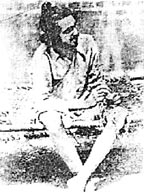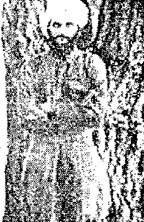On the Execution of Bhagat Singh,
Periyar, March 29, 1931
 "The aim of life is no more to control the mind, but to
develop it harmoniously: not to achieve salvation here after, but to make the
best use of life here below; and not to realise truth, beauty and good only in
contemplation, but also in the actual experience of daily life: social progress
depends not upon the ennoblement of the few but on the enrichment of democracy;
universal brotherhood can be achieved only when there is an equality of
opportunity – of opportunity in the social, political and individual life."
"The aim of life is no more to control the mind, but to
develop it harmoniously: not to achieve salvation here after, but to make the
best use of life here below; and not to realise truth, beauty and good only in
contemplation, but also in the actual experience of daily life: social progress
depends not upon the ennoblement of the few but on the enrichment of democracy;
universal brotherhood can be achieved only when there is an equality of
opportunity – of opportunity in the social, political and individual life."
[The following is the editorial Periyar E.V. Ramasami wrote
in his Tamil Weekly Kudi Arasu dated 29th March 1931. Translation by
Aasaan.
The editorial highlights the point that Bhagat Singh’s
outspoken progressive views and supreme sacrifice have disabused the minds of
the people and made them realise the retrograde nature of the ideals and methods
of Mahatma Gandhi.]
Periyar’s Editorial dated 29th March, 1931:
There is no one who has not condoled the death of Mr. Bhagat
Singh by hanging. There is none who has not condemned the government for hanging
him. Besides, we now see several people known as patriots and national heroes
scolding Mr. Gandhi for the happening of this event.
While this happens in one place, let us see what the same
group of people do in another place. They congratulate Lord Irwin, the Vice-roy.
They praise Mr. Gandhi for coming to an agreement with him. They are not only
satisfied that the agreement has been reached without laying down the condition
of not to hang Bhagat Singh, but also consider the signing of such an
agreement as a great victory and celebrate the same. In addition, Mr. Gandhi
says that Lord Irwin is a Mahatma (great soul), and has ordered the common
people of the country to address the Vice-roy the same way. Lord Irwin
publicises Mr. Gandhi among divinity.
The same people who have been hailing Mr. Gandhi as a great
leader are now shouting ‘down with Gandhi’ and ‘down with congress.’ They show
black flags wherever he goes, and disturb the meetings he addresses. These
things have become common.
When we witness these things we are at a loss to find out
either the opinion of the public or the principle they entertain regarding
political affairs. We also doubt if they really adhere to any principle.
Whatever be the position of the public, even when Gandhi
started the agitation of Salt Satyagraha, we explained elaborately that it would
not only be of no use to the people, but also hostile to the progress of the
country and to the liberation of the suffering class.
Even Gandhi has said clearly and openly admitting that the
reason for starting the agitation had been to spoil and undo the work
done by persons like Bhagat Singh.
To supplement (these things), the real socialists among the
neighbours have been proclaiming loudly: "Mr. Gandhi bas betrayed the poor. He
does these things to eradicate the socialist principles. Down with Gandhi, down
with Congress." But our known national heroes and patriots never cared for
these reactions. They did not realise the pros and cons of anything. Like
those who fall into the well holding the lamp, like those who clash against the
rock accepting the challenge, they were blindly and wildly enthusiastic (about
the Salt Agitation). They went to prison and returned ‘triumphantly’. They
accepted the honour connected with it. And now after finding Bhagat Singh
hanged, they also shout, ‘Down with Gandhi’, ‘Down with Congress’. We do not
understand what benefit will ensue due to such behaviour.
 As far as we are concerned, let us tell the truth: There are
idiots and fools in this land. They do not think of the pros and cons of a
course of action, but selfishly seek their own honour. Had Bhagat Singh lived
long, he would have to suffer of such people. Instead, it is good that Bhagat
Singh is dead and has found ‘peace’. I am sad that I cannot get such a great
rare chance (paeru).
As far as we are concerned, let us tell the truth: There are
idiots and fools in this land. They do not think of the pros and cons of a
course of action, but selfishly seek their own honour. Had Bhagat Singh lived
long, he would have to suffer of such people. Instead, it is good that Bhagat
Singh is dead and has found ‘peace’. I am sad that I cannot get such a great
rare chance (paeru).
The issue is whether a man has done his duty or not. The
issue is not whether the action has borne fruit. Yet we agree that we should do
our duty, taking into account the time and place. We are sure that time, place
and the general trend are not hostile to the principle upheld by Bhagat Singh.
Though it occurs to our mind that he has erred a little in choosing the means to
translate his principle into practice, we will never at any time be emboldened
to say that his principle is a flawed one. It alone will make peace prevail in
this world.
If Bhagat Singh had came to the firm and sincere conclusion
that all his principles were correct, and that the methods he had used were the
just ones, then he should have definitely conducted himself only in the way he
had done. If he had not so conducted himself, we could not say he was an honest
person. So we now say that he is a true man. It is our strong view that only
Bhagat Singh’s principle is needed to India.
As far as we know, Bhagat Singh’s principle represented
socialism and communism. As an evidence in this view, we find the following
lines in the letter he wrote to the governor of the province of the Punjab:
"Till Communist Party comes to power and people live without
unequal status, our struggle will continue: It cannot be brought to an end by
killing us: it will continue openly and secretly:"
Further, we think that Bhagat Singh had no faith in god and
in divine dispensation, but was a man of self-confidence. Holding such views is
not a crime under any law. Even if it is considered to be against any law, no
one need to be afraid of it because, we are sure, that following those
principles (that Bhagat Singh upheld) will not do any harm or cause any loss to
the public. If by chance any harm or loss takes place, it will be unintentional.
We endeavour to put the principle into practice wholeheartedly, without
entertaining personal hatred towards individuals or towards communities or
towards the people of any other land. We do our work without causing injury to
any person, but we are ready to undergo extreme suffering for the cause we
espouse. So we need not worry about or be afraid of anything.
The same philosophy that underlies our endeavour to eradicate
untouchability also forms the basis of the efforts to remove poverty. To abolish
untouchability we have to abolish the principle of upper and lower castes. In
the same manner, to remove poverty we have to do away with the principle of
capitalists and wage-earners. So socialism and communism are nothing but getting
rid of these concepts and systems. These are the principles Bhagat Singh stood
for. It is no wonder that those who consider them just and necessary call for
the downfall of Gandhi and Congress. What is very strange is that those who
advocate these principles hail Gandhi and Congress.
The day when Gandhi said that god alone guides him, that
Varnashrama Dharma is a superior system fit to govern the affairs of the
world, and that everything happens according to god’s will, we came to the
conclusion that there is no difference between Gandhism and Brahmanism. We also
concluded that unless the Congress Party that subscribes to such philosophy and
principle is abolished, it will not be good to the country. But now this fact
has been found out at least by some of the people. They have gained the wisdom
and courage to call for the downfall of Gandhism. This is a great victory to our
cause. If Bhagat Singh had not died by being hanged, there would not have been
any chance for this victory to take place in such a popular manner. We even
venture to say that Gandhism would have gained more ground if Bhagat Singh had
not been hanged.
Bhagat Singh had not fallen sick, suffered and died as it
normally happens with people. He gave his life for the noble cause of showing to
India, nay to the world, the path of real equality and peace. He has reached a
great height, a feat never achieved normally by any one else. We applaud and
sing of his martyrdom from the depth of our heart. At the same time, we request
those in our government to find out and hang four true persons like Bhagat Singh
in each of the provinces.
The Modern Rationalist
November 2006
Click here to return to the
index of archival material
 "The aim of life is no more to control the mind, but to
develop it harmoniously: not to achieve salvation here after, but to make the
best use of life here below; and not to realise truth, beauty and good only in
contemplation, but also in the actual experience of daily life: social progress
depends not upon the ennoblement of the few but on the enrichment of democracy;
universal brotherhood can be achieved only when there is an equality of
opportunity – of opportunity in the social, political and individual life."
"The aim of life is no more to control the mind, but to
develop it harmoniously: not to achieve salvation here after, but to make the
best use of life here below; and not to realise truth, beauty and good only in
contemplation, but also in the actual experience of daily life: social progress
depends not upon the ennoblement of the few but on the enrichment of democracy;
universal brotherhood can be achieved only when there is an equality of
opportunity – of opportunity in the social, political and individual life." As far as we are concerned, let us tell the truth: There are
idiots and fools in this land. They do not think of the pros and cons of a
course of action, but selfishly seek their own honour. Had Bhagat Singh lived
long, he would have to suffer of such people. Instead, it is good that Bhagat
Singh is dead and has found ‘peace’. I am sad that I cannot get such a great
rare chance (paeru).
As far as we are concerned, let us tell the truth: There are
idiots and fools in this land. They do not think of the pros and cons of a
course of action, but selfishly seek their own honour. Had Bhagat Singh lived
long, he would have to suffer of such people. Instead, it is good that Bhagat
Singh is dead and has found ‘peace’. I am sad that I cannot get such a great
rare chance (paeru).